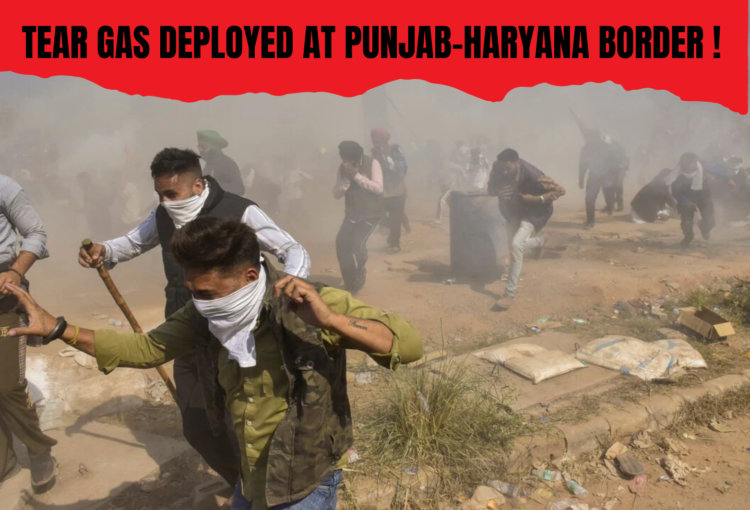The Battle at the Punjab-Haryana Border: Farmers’ Unyielding Stand
New Delhi: Tear gas shells were fired this morning at the Punjab-Haryana border, where thousands of farmers have gathered to march on a heavily fortified Delhi after rejecting the government’s offer of a five-year MSP contract. A fifth round of talks is likely.
Tensions escalate as tear gas fills the air at the Punjab-Haryana border, where determined farmers stand face-to-face with security forces. Rejecting the government’s offer and demanding fair treatment, they march towards New Delhi, prompting discussions for a fifth round of talks.
Farmer groups have formed a human chain at the Shambhu border crossing. Dramatic visuals from the area show the two sides lined up against the other – on one side is an army of heavy earth-moving machines, or JCBs, and tractors, and on the other are the security forces, including paramilitary personnel with riot gear and equipment. Haryana Police have already fired one round of tear gas, and have warned the farmers – who number around 10,000 with 1,200 tractors/trolleys – to stand down. The farmers, a police statement said, are also “arming youth with sticks, stones, face masks (to protect against the tear gas) and iron shields to attack” security personnel.
1. The Scene Unfolds: At the Shambhu border, dramatic scenes unfold as farmers form a human chain against a backdrop of heavy machinery and riot gear-clad security personnel. With tear gas fired and warnings issued, the confrontation intensifies.
The state’s police force has also ramped up measures to stop farmers from reaching Delhi, which is around 200 km from Shambhu. This includes blocking highways with multiple layers of concrete barriers, barbed wire fences, and even nail strips, to stop tractors. The farmers, though, appear undaunted and, in a moment of innovation, constructed a makeshift ‘tank’ Tuesday evening – a JCB machine on a tractor with the driver/operator cabins covered with iron sheets as protection from tear gas shells and rubber pellets.
2.The Farmers’ Resolve: Undeterred by barriers and police measures, farmers press on towards Delhi, demonstrating resilience and innovation. From makeshift ‘tanks’ to strategic maneuvers, their determination remains unyielding.
Security around Delhi has been heightened also, with key border crossings, including Ghazipur, Tikri, Noida, and Singhu blocked with rows of metal and cement barriers. Police have deployed LRADs, or Long Range Acoustic Devices, or crowd-control sound cannons, and imposed a month-long ban on public gatherings.
3. Government’s Call for Dialogue: Amidst the chaos, Agriculture Minister Arjun Munda extends an invitation for further discussions, emphasizing the government’s willingness to address farmers’ concerns, including the critical issue of MSP.
Agriculture Minister Arjun Munda has called for another round of talks. “After the fourth round, the government is ready to discuss all issues… including MSP (minimum support price). I invite all farmer leaders for talks.” Mr Munda – who told NDTV “unruly elements are looking to hijack talks” – has also urged farmers to ensure a peaceful protest.

On Monday evening farmer leaders snubbed the government’s offer to buy maize, cotton, and three types of pulses – toor, urad, and masoor – at the old MSP. They said it did not make sense as it applied to only a few crops, and ignored those growing the other 18. The farmers said the price – based on the A2+FL+50 per cent formula (MSP at 1.5 times direct costs, such as seeds and fertilisers, and unpaid family labour), and not the Swaminathan Commission’s C2+50 per cent formula (which includes rent for farm land, or the rental value of owned land) – would be “subsistence” payments and not “income”.
5. The Demands Persist: Beyond MSP, farmers advocate for a comprehensive set of demands, from loan waivers to justice for past incidents. Their demands reflect broader systemic issues affecting agricultural livelihoods.
They were also unhappy with a clause that said MSP would only be for those opting for crop diversification. “We have, thus, decided to reject the proposal…” one farmer leader told NDTV. Apart from MSP, the farmers also want loan waivers, no hike in electricity tariffs, and withdrawal of police cases from 2020/21. They also want a public sector crop insurance scheme, a monthly pension of ₹ 10,000 to farmers over 60, and that Union Minister Ajay Mishra Teni prosecuted over the Lakhimpur Kheri incident.
Conclusion: As the standoff persists, the clash at the Punjab-Haryana border underscores the deep-rooted grievances within India’s agricultural community. The farmers’ unwavering determination and the government’s call for dialogue set the stage for a pivotal moment in India’s agricultural landscape.
Do you want to publish your own book?
We will help you get the best options for book publishing related services in India that helps you to self publish your book professionally. Complete set of publishing services. From designing book covers to publishing, promotion to distribution we provide them all. Click here to get free call back from our team consulting you regarding the publishing costs and the process.
Read Some of Our Other Blogs:
How to Protect Your Juvenile Rights in India
Marital Rape – An Unrecognized Crime in India
Unveiling the ambiguity regarding bar on ‘Anticipatory Bail’ under SC/ST (POA) Act, 1989
Development in interpretation of ‘sedition’ law in India